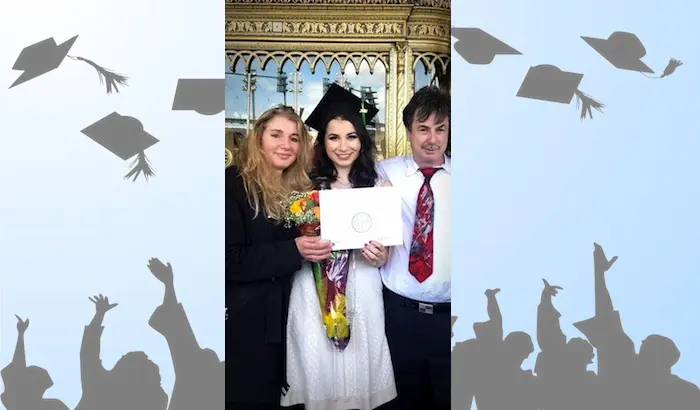
|
| Ola Hadaya with her parents |
DETROIT — It is said that all Arab parents want their children to be doctors.
To deflect their families’ wishes, high school graduates sometimes complain that do not want to spend their youth on a college campus. Ola Hadaya did not have this problem. She graduated from Wayne State University with a medical degree at 21.
Hadaya, whose father is a physician and mother is a mechanical engineer, repeatedly expressed gratitude to her parents, saying her achievement would not have been possible without their support.
Her mother taught her math and science beyond the curriculum after school. The additional knowledge allowed her to skip the third, fifth and seventh grades. In high school, she took advanced courses and was able to enroll in college classes while acquiring her diploma.
She said her father was the spokesperson for her education and helped convince school officials to allow her into classes above her years.
Hadaya, who was born and raised in New Jersey to a Syrian family, was accepted at Wayne State University’s medical school at 17, before she could vote.
She said enjoyed the diversity of southeast Michigan while attending WSU and added that being in contact of people from different cultures and backgrounds is a big part of learning and growing.
When she is not studying, Hadaya likes to bake, write, read and draw. Intuitively, one would think the newly graduated doctor barely has time to herself, but she has managed to write a fantasy novel.
“You can always make time for what you want,” she said. “I have a bunch of interests. All these interests sometimes conflict with each other, but you can balance them out somehow.”
Hadaya went back to New Jersey, where she will start her residency as an ob-gyn in July.
The Syrian American physician’s advice to younger students is not to fret over the small details.
“Things tend to end up where you fit in,” she said. “Everything tends to work out in the end, so keep focus on the bigger picture. Never lose sight of what you actually want.”
Everyone have weaknesses, but dealing with them makes all the difference, Hadaya added.
“If there is something that you don’t like about yourself, just learn from it and use it to make yourself a better person,” she said.
She added that overcoming frustrations makes one a stronger person.
Hadaya recalled everyone towering over her when she started high school at 11. She has been around older classmates for most of her life. She said the situation was challenging at first. But with self-awareness, she used the difficulties to gain maturity and adjust mentally to think beyond her age.
“Years give you the opportunity for experience, not necessarily the maturity,” she said.
The young doctor said her Syrian heritage has helped shape her perspective on school and life. She said Arabs, particularly Syrians, hold education in high regards. She also learned resilience, passion and flexibility from her upbringing as a Syrian American.
The WSU grad is flattered by the attention she has been receiving since graduating.
“I’m very happy because I had the opportunity to show that a Muslim woman from Syrian parents was able to be such a good example, almost a role model, to younger people and to show them that if you want something, you can work towards it,” Hadaya said. “I feel very honored and blessed to have that opportunity.”
Hadaya giggled when she was called “Dr. Ola.” She is still not used to the title.






Leave a Reply